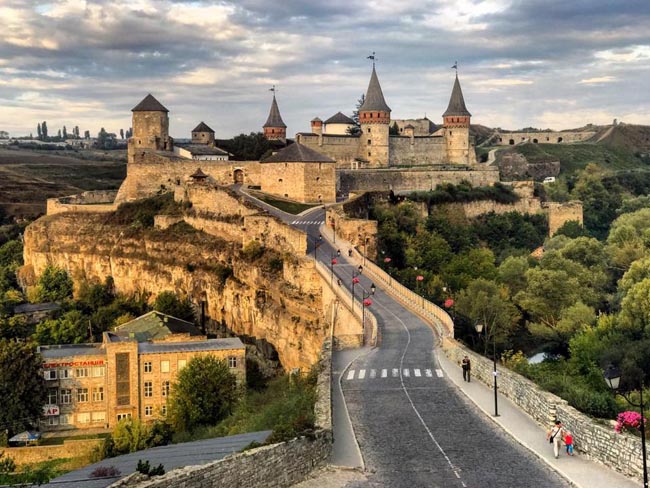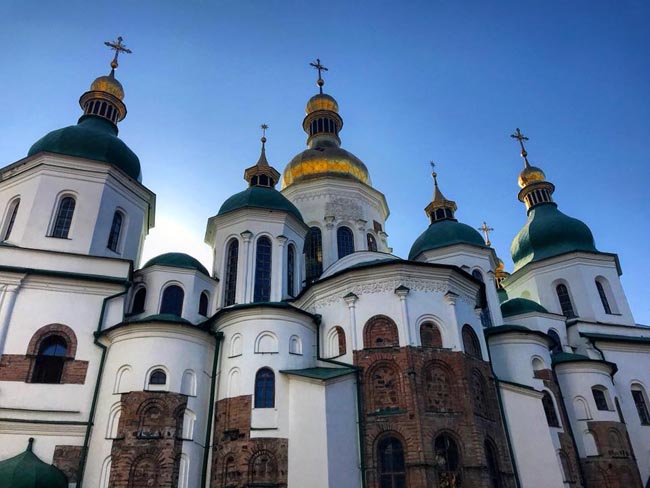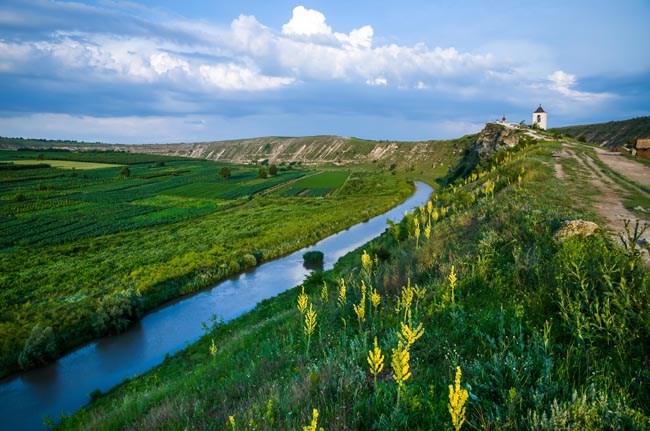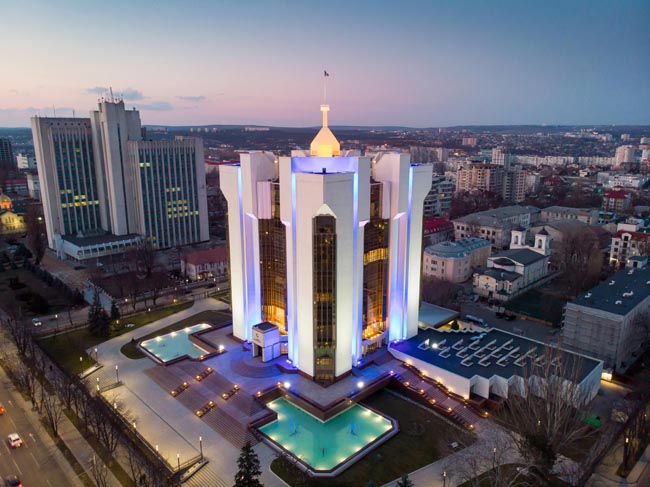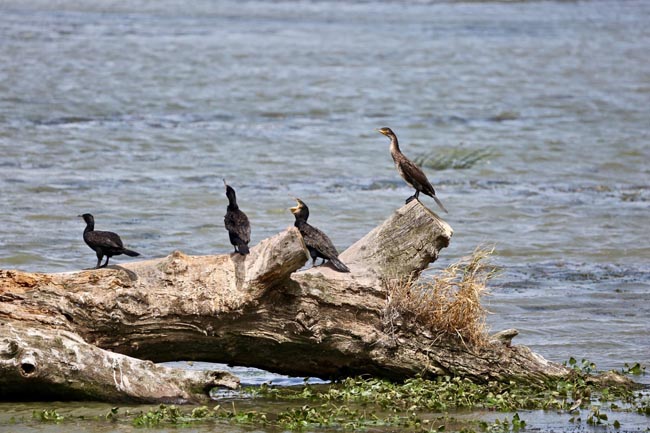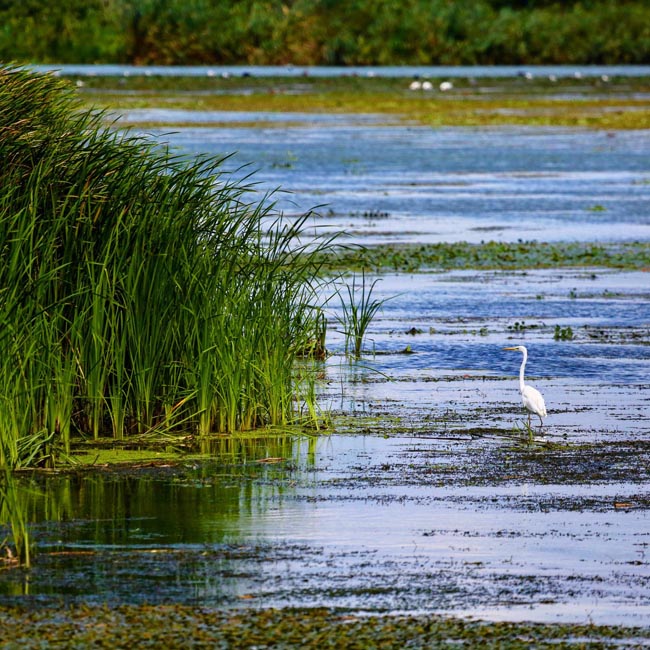*** For dates in 2021 onward, please refer to tour code JHMK ***
This is an excellent and thorough treatment of these three friendly and distinct neighbours. This is also an up-and-coming region that still offers a relatively good value for your travel dollars! Of course, given these countries' long and complicated histories, a lot of our activities and sites of interest will reflect religious and fortified monuments, art and architecture, but we also do our best to showcase it's varied cultural attributes, past and present.
Download Itinerary
Day 1 Arrival in Minsk
Welcome to Belarus!
Belarus, part of the Newly Independent States (N.I.S.), is a vast country with stretches of unbroken birch groves, large forested marshlands and gently sloping green fields amidst wooden villages that time forgot in the 18th century. Belarus borders Russia in the north and east, Poland in the west, Latvia and Lithuania in the northeast and Ukraine in the south. Minsk is the capital of Belarus and was completely rebuilt after the Second World War.
Overnight in Minsk.
Included Meal(s): Dinner
Day 2 Minsk: City Tour & Dudutki Folk Museum
In a country rich in war memorials, Minsk is the greatest of all testimonies to the atrocities of the Great Patriotic War. It's estimated that nearly half of the city's population perished during WWII. Today, Belarus is striving to balance the preservation of its independence with the need for economic partnership with neighbouring Russia.
Today we have a city tour including Independence Square with the House of Government and "Red" Krasny Roman Catholic Church; Victory Square with its tall grey obelisk and eternal flame honouring the heroes of World War II; Troitskoye Predmestye (Trinity Suburb) -- restored buildings of the 19th century, Holy trinity Cathedral and St.Catherine's Church -- architectural monuments of the 17th century.
Our attention then shifts to Belarus as an ancient country with rich history and folklore. We visit the Dudutki Complex, created in order to present the oldest forms of culture and daily routine of the medieval people of Belarus to younger generations and foreign visitors of the state. The founders of the complex pursued the goal to restore a 19th century Belarusian manor with all the subsidiary services and workshops that existed here only decades ago. These include stables, pottery, forge, cheese dairy and several others – all in full order and operational. In the course of the tour you will hear about the development of the Belarusian village and the history of folk crafts that were practiced by the local peasants to improve their standard of living.
Overnight in Minsk.
Included Meal(s): Breakfast and Dinner
Not finding what you're looking for?
Our specialists can take away the stress and create a private custom tour tailored to your exact interests and budget.
Day 3 Minsk: Khatyn National Memorial Complex
We get the morning off to a somber start with a visit to the Khatyn National Memorial Complex.
In January 1966, the Central Committee of the Communist Party of Belarus built the memorial complex in memory of the hundreds of Belorussian villages destroyed by Nazis during this period, making it the most significant war memorial in Belarus. Sadly, the Khatyn massacre was not an unusual incident in Belarus during the second World War. At least 5,295 Belarusian settlements were burned, destroyed by the Nazis and some or all their inhabitants were killed as a punishment for collaboration with partisans. Altogether, over two million people were killed in Belarus during the three years of Nazi occupation, almost a quarter of the country's population.
The Khatyn complex has 26 chimneys with bells -- one for each of the houses in the village -- which ring out every minute. Each chimney has a plate where listed family members who died. 6m bronze statue called "The Unconquered Man," stands at the center of the memorial complex as an homage to Joseph Kaminski and his son. There is also a small museum with photo gallery on the territory.
We also visit the Mound of Glory and Museum of Great Patriotic War.
Overnight in Minsk.
Included Meal(s): Breakfast and Dinner
Day 4 Minsk - Nyasvizh & Mir Castle - Brest
Today's (full-day) journey takes us to Nyasvizh, a great place to get in touch with Belarus's past. This quiet but green and attractive town is one of the oldest in the country, dating from the 13th century. It reached its zenith in the mid-16th century while owned by the mighty Radziwill magnates, who are responsible for building the palace that is the town's most outstanding attraction.
We continue to Mir Castle (Mirsky Zamok), an outstanding example of 16th-century fortification art. In 2000 UNESCO designated Mir Castle a World Cultural and Natural Heritage site for its successful blend of Gothic, Baroque and Renaissance architecture making it one of the most impressive castles in Europe.
We continue to Brest, first mentioned in 1019 as Bierascie. It is believed that ancient city's name comes either from the word "bierast" -- a species of elm, or from the word "bierasta" meaning birchbark. The city's name was changed several times during its history. In the beginning of the 18th century the city's ancient name was changed into Brest-Litowsk. New name lived till the beginning of the 20th century when its second part was discarded and the city has become simply Brest.
Overnight in Brest.
Included Meal(s): Breakfast and Dinner
Day 5 Brest Touring - Hrodna
This morning we tour Brest, including Brest Fortress, founded on the 1st of June in 1836. The territory of the old town was given for its construction; the Citadel is the main fortification of the fortress. It was placed in the central island and the Volyn, the Cobrin and the Terespol fortifications surrounded it. The fortress isn't merely a remarkable military construction; it is also an interesting architectural complex. The Brest fortress got universal fame during the Great Patriotic war and one of the most important Soviet WWII war monuments marking the heroic resistance of the Red Army against the surprise German attack on June 22, 1941. The ruins of the White Palace are visible from the fortress and mark the site where the 1918 Brest-Litovsk treaty was signed. Our visit will also include a walking tour of the city centre.
After our tour we travel by road to Hrodna (Grodno), possibly beginning our sightseeing if time permits.
Overnight in Hrodna.
Included Meal(s): Breakfast and Dinner
Day 6 Hrodna Touring - Minsk
We begin our walking tour of Hrodna at Market (Soviet) Square, the Synagogue, the firefighting watchtower, and other attractions. Then we drive to see the 19th century New World (Novy Svet) district and the former Gorodnitsa area behind Lenin Square. The walk will be extended along Ozheshko Street to see the parish Russian Orthodox Church and a protestant church – the only operational Kirche in Belarus.
We then depart by road for our journey back to Minsk.*
* Looking at a map, it might seem more logical to continue overland to Lviv from here rather than circling back to Minsk. We choose to fly from Minsk to Lviv in order to avoid certain complications presented by Belarusian visa limitations. In order to avoid having to acquire this visa in advance (a major hassle), we need to depart the country by air, not via a land border. If we fly in and out of Belarus, we qualify for a visa on arrival in Minsk, avoiding a major headache and extra expense.
Overnight in Minsk.
Included Meal(s): Breakfast and Dinner
Day 7 Minsk, Belarus - Fly to Lviv, Ukraine
Today we fly to Lviv, Ukraine.
Lviv is the "capital" of Western Ukraine and one of the country's most impressive cities. Founded in the 13th C. by King Danylo Halytckyj, it was named in honour of his son Lev (Leo). Through centuries of Polish, Austrian, and Soviet occupation, Lviv was the gateway to "the East", but with independence in 1991, Lviv is finally free to develop its own Ukrainian identity.
Flight time permitting, we may begin our sightseeing program upon arrival.
Overnight in Lviv.
Included Meal(s): Breakfast and Dinner
Day 8 Lviv: City Tour
Lviv, a UNESCO World Heritage Site, has a rich and impressive history. Numerous historical events are concerned with the city and Lviv buildings still keep the spirit of past centuries; cozy streets and fascinating monuments make it a unique attraction among the Ukrainian and Eastern European cities.
Lviv's architectural landscape joins the monuments of numerous styles and different epochs. We will have a 3-4 hour walking tour of the centre of L'viv that will include an orientation of the traditional limits of the old town. We will view the Renaissance-style Bernardine Monastery, the Armenian Church and the Cathedral of Dominicans, amongst other important architectural marvels that give this city its character.
Typically we finish our tour close to the Opera House (exterior) which is located nearby to your hotel. With your free time in the afternoon you may choose to take the opportunity to visit the many small museums, including the Old Pharmacy Museum, Lviv Historical Museum, and the Museum of Ethnography and Crafts. There is also a chance to climb the many steps up to the viewpoint above the central Rynok Square at L'viv City Hall.
Overnight in Lviv.
Included Meal(s): Breakfast and Dinner
Day 9 Lviv: Lychakivsky Cemetery & Museum of Folk Architecture & Rural Life
Today we will drive out to the Lychaivsky Cemetery. With the same sort of overgrown grounds and Gothic aura as the famous Parisian necropolis, Pere Lachaise, is the the final resting place for more than 400,000 people. A trip to L'viv wouldn't be complete without a wander here. Initially opened in 1787 in compliance with an Austrian law to move burials from the centre of town, the cemetery soon became one of Europe's finest. Generations of Lvovians were laid to rest here: intelligentsia, bourgeoisie and nobility.
We also visit the Lviv Museum of Folk Architecture and Rural Life, an open-air museum containing 120 monuments of folk architecture including six wooden churches, which create a genuine atmosphere of Ukrainian villages from different regions of the country. Time at leisure.
We include lunch instead of dinner today to free you up for the opera or theatre. Your Tour Leader can help you plan your evening.
Overnight in Lviv.
Included Meal(s): Breakfast and Lunch
Day 10 Lviv - Kamianets-Podilskyi
Today we drive to Kamianets-Podilskyi. After we check in to our hotel we'll embark upon a afternoon visit of town and fortress. No epithet is able to describe fully the splendor of this ancient city, which no other city can match, even in Europe. An incredible quantity of amazing 11th-19th centuries monuments and landmarks are concentrated on the territory of the Old City. They are a big reason why this city is on the list of UNESCO World Heritage Sites.
Despite the twists in history, Kamianets-Podilskyi has managed to preserve its priceless buildings almost unchanged. The main sight is still the Ancient Fortress, considered to be one of the best samples of fortification buildings in Eastern Europe. In the towers and dungeons of the fortress are unique exhibitions, which brightly illustrate the pages of Kamianets-Podilskyi's history: scenes of medieval trials, defenses of the fort, and weapons collections are all depicted. The sacral architecture of Kamianets-Podilskyi is no less impressive – it fascinates with its richness and variety of represented cultures.
A special place among the treasures of the city belongs to the Armenian Cathedral and to the St. Peter and Paul Catholic Church, an example of the beauty that combination of two different religious architectures can bring. The complex of the Dominican Monastery also bears the imprints of different epochs and styles. And St. Nicolas's Catholic Church, included in the complex, is considered to be one of the most ancient city temples. Because of so many historic monuments, Kamianets-Podilskyi gives you the opportunity to dive into a truly medieval atmosphere.
Overnight in Kamianets-Podilskyi.
Included Meal(s): Breakfast and Dinner
Day 11 Kamianets-Podilskyi, Ukraine - Soroca, Moldova: City Tour
Today we cross into Moldova.
Although not well-known, Moldova offers some attractions that would surprise even the most seasoned traveller. Little Moldova has a landscape covered with vineyards, pristine forests and lakes, medieval monasteries and fortresses, wine caves stretch for miles, a rich history, and eight ethnic nationalities. A chronicler once called Moldova "a country on the way of all disasters". Indeed the territory of Moldova is located on the boundary of Eastern and Western Europe and has been populated from ancient times. The earliest leavings are of the post-Paleolithic times, then the Chernyakhovskaya culture, and the treasures of the Romans, to the 4th century AD, the Slavonic settlements in the 8th-9th centuries. The ancient Romans and wandering tribes that used to migrate over this territory left vestiges of their stay.
En route we stop at Khotyn Fortress, one of the most popular objects of the kind in Ukraine. This fortress impresses with its power and impregnability and is one of the best-preserved fortifications on the continent.
We continue to Soroca and a city tour on arrival. The city is famous for the impressive walls of Soroca fortress, whose historical interest is reflected in its walls preserved since the Middle Ages. Gypsy Hill is a Unique Quarter of the Gypsies, settled purely by the Roman people led by a gypsy baron in Moldova. During Soviet times they managed to successfully combine their customs with those of local inhabitants. Later the hills of Soroca town got the name "Hill of Gypsies" where the elegant houses and buildings under the name "Swallow's nest" were built.
"The Candle of Gratitude" was lit on 27th March, 2004 to honour the author of a well-known Moldavian ballad "Miorita". It's actually a church in shape of a burning candle made of stone. An amazing view from this striking building opens to the river Nistru.
Overnight in Soroca.
Included Meal(s): Breakfast and Dinner
Day 12 Soroca - Orheuil Monastery - Chisinau
Today's route takes us to Orheuil Monastery.
Among Moldova's greatest wonders are its monasteries, and we visit the most famous, the cave monastery in Orhei Vechi. This 13th century church was excavated from a limestone cliff by Orthodox Christian monks who believed the cave would be resilient against invaders. Archaeologists have recently discovered ruins of Turkish baths and a protective wall built in the 15th century, which surrounds the religious complex. Stefan the Great erected a fortress in Orhei Vechi in the 14th century, destroyed by Tartar invaders in 1499. The monastery was inhabited until the 1th century; closed during Soviet times, it was reopened in 1996 and services are now held regularly.
We continue to Chisinau, the capital of Moldova.
Overnight in Chisinau.
Included Meal(s): Breakfast and Dinner
Day 13 Chisinau: City & Wine Tour
The history and life of Moldova through the centuries is best presented in the History and Regional Lore Museum, a beautiful Turkish-style complex, which we will visit along with the Fine Arts Museum, which houses good examples of Russian, West European, and Moldovan paintings, sculpture and applied arts.
A visit to Moldova would not be complete without a trip to the Moldovan wine country. We visit Cricova, the world's largest wine cellar. It is actually a subterranean city with winding streets extending for 60 kilometres (37 miles). The street names orient visitors toward Str Cabernet, Str Pinot or Str Merlot. There are over one million bottles of white wines -- 648 types are stored in the cellars at a uniform temperature of 12C (54 F). A tour of Cricova is one of the best ways to sample the wide variety of Moldovan wines and champagne, which are gaining great popularity outside Moldova's borders, including Western Europe and North America.
Overnight in Chisinau.
Included Meal(s): Breakfast and Dinner
Day 14 Chisinau - Bendery - Tiraspol
We depart Chisinau for the town of Bendery, the site of a fortress commanding the Dneister crossings since the second century BC. The original 12th century fortress wall was built by the Genoese who traded actively with Black Sea ports and fell to the Turks in the 16th century. The rectangular fort with its citadel was built by the Turks in the 1530's and was besieged several times by the Russians in the 18th century as part of their drive for Bessarabia. It was all but destroyed in the German retreat of 1944.
We continue our journey, traversing the valley of the Dneister River with its orchards and vineyards. Our destination is Tiraspol, 'capital' of the disputed Transnistria (or Transdniestria) region. The city was founded as a stronghold by General Suvorov in 1792 but named after the ancient Greek colony of Tiras. Built in the grid pattern of 18th century "new towns", Tiraspol retains traces of the original fort. Some of the older houses, with their traditional Moldovan balconies, betray a Turkish influence. Our tour will also include a visit to the famous "cognac" factory.
Overnight in Tiraspol.
Included Meal(s): Breakfast and Dinner
Day 15 Tiraspol, Moldova - Odesa, Ukraine
We drive to Ukraine border and continue to Bilhorod-Dnistrovsky. En route we visit the impressive fortress on the banks of the Dnister River. Stefan II of Moldavia founded the 13th century fortress, one of the Ukraine's largest, on a strategic spur of land overlooking the Dnister estuary. The drive to get here is picturesque, taking us through a rural region of quiet villages, farmland, rural communities, and providing us with an occasional view of the Black Sea.
Continue to Odesa.
Overnight in Odesa.
Included Meal(s): Breakfast and Dinner
Day 16 Odesa: City Tour
From ancient times, Odesa (Odessa) was inhabited by Scythians, Sarmats, Greeks, and Slavs. In the times of Kyiv Rus it was a part of this huge Slavic state. In the 13th century it was annexed to the Tartar-Mongol empire, the "Golden Horde". At the beginning of the 15th century it was annexed to Lithuania, and in some 50 years, to Turkey. In 1791 the territory became a part of the Russian Empire.
Today we enjoy a half-day city walking tour, including many architectural sites of 19th & 20th centuries, many of them designed by world famous architects and engineers. Most notable are the Opera House (resembling the Vienna Opera and the Dresden Court Theater built in 884-87); the Marine (Potyomkin) Stairway (1837-41) – one of the largest stairways in the world; and the heart of Odesa and immortalized in Sergei Eisensteins's 1925 film, Battleship Potemkin; Deribasivska (Deribasovskaya) Street with plenty of shops, cafes and restaurants. We will also visit the five-domed Uspensky Cathedral.
There will be some free time in the afternoon; Odesa is a great city for walking and this free time will give you a chance to do some exploring on your own.
Overnight in Odesa.
Included Meal(s): Breakfast and Dinner
Day 17 Odesa Catacombs - Fly to Kyiv
Today we board our coach for a visit of the Odesa Catacombs, created nearly 200 years ago during mining of building materials that were used to build the city. Currently it is the maze of 2500 km of entrances, exits, caves, and tunnels. During the WWII campaigns, in 1941, when the German and Romanian armies occupied Odesa, the Soviet military headquarters gave the order to organized the partisan resistance, and the catacombs were chosen as the camp for the partisans. Their store of provisions and weapons allowed tham to survive underground for half a year. The partisan unit was fighting against the Nazi and Romanian army during the entire period of occupation. We will also take the oppportunity to visit Launcheven Beach to get close to the Black Sea.
We then transfer to the airport for our flight to Kyiv.
Overnight in Kyiv.
Included Meal(s): Breakfast and Dinner
Day 18 Kyiv & Chornobyl
Today we embark on our full-day tour to the site of Chornobyl ('Chernobyl' is the former Russian spelling)*. Of course, Chornobyl is well known for the nuclear accident that occurred there on April 26th, 1986 at the power plant that was under the jurisdiction of the USSR. This is considered to be one of the worst nuclear disasters in history as the contamination spread across much of Europe and the western USSR.
Our tour will include access to the 30-kilometre Exclusion Zone where we will get a briefing on the practices used to de-contaminate the area and to visit the town of Chornobyl, including the Wormwood Star Memorial, the St Ilya Church, and the memorial to "Those Who Save The World". Our tour will proceed to the 10-kilometre zone where we will take in the remains of Kopachi Village and Pripyat town and a close view of Reactor Number 4.
Tours have now been running to the Chornobyl site for some time and we will be given a briefing on the site visit with regards to safety issues, but there is no reason to be alarmed for one's safety provided we follow their instructions on how to conduct the sightseeing.
* PLEASE NOTE that you must come prepared with long sleeves and trousers (no skirts) and closed shoes only for this excursion. Failure to comply will result in your non-participation.
We will return to Kyiv after a full day.
Overnight in Kyiv.
Included Meal(s): Breakfast, Lunch and Dinner
Day 19 Kyiv: City Tour
Today we have a full day touring Kyiv, including the cathedral of Hagia Sophia, the oldest cathedral in Ukraine. Founded in the early 11th century, and largely rebuilt during the 17th and 18th centuries, it is now a museum with beautiful Christian frescoes. St Sophia Cathedral is inscribed on the UNESCO list of the most important monuments of the world's cultural heritage. We also see the Golden Gate, St Andrew's Church, designed by Rastrelli, the famous architect who built the world famous Winter Palace in St.Petersburg; St Michael's Monastery, monuments to Yaroslav the Wise, Princess Olga, and the monument to Prince Vladimir.
We also visit the Kyiv-Pechersk Lavra Monastery where we will be able to see the famous caves, one of the most sacred places of Orthodox Christianity. The museum boasts a wealth of precious historical items and collections of ancient books and icons.
Overnight in Kyiv.
Included Meal(s): Breakfast and Dinner
Day 20 Departure from Kyiv
Departure from Kyiv.
PLEASE NOTE that past travellers have commented on Kyiv's wealth of attractions and that it would be a great place to extend for some independent sightseeing.
SAFE TRAVELS!
Included Meal(s): Breakfast
Inclusions
Breakfast and most dinners (hotels & local restaurants) daily and one lunch. All transport, accommodation, transport (including internal flights), sightseeing and entrance fees for sites noted as 'visited' in the detailed itinerary. Gratuities for local guides, drivers, restaurant staff, porters. Airport transfers for land & air customers.
Exclusions
International airfare to/from the tour. Tour Leader gratuities, most lunches (per tour itinerary), drinks, personal items (phone, laundry, etc), domestic and international air taxes (if applicable), excursions referenced as 'optional'. Airport transfers for Land Only customers.
Our post-reservation trip notes offer further guidance on optional meal costs and shopping. There are no visas-in-advance required for this tour.
Seasonality and Weather
This tour is offered in the late spring and early fall when temperatures and humidity are quite comfortable. Rain showers are possible at any time of year. Our later Sept/Oct date will experience cool weather and a greater possibility of showers.
Transport and Travel Conditions
Land transport throughout by private air-conditioned motor coach, 24-36 seats depending on ultimate group size (see 'group size'). Though we will have a couple of full bus days there are plenty of stops of interest.
This trip is typical of most of our European tours, which are ambitious and involve full days of travel and sightseeing. While we don't have any actual strenuous activity (ie hiking) built into the program, you will do a lot of walking on this trip. These walks will mostly be in the form of walking tours of towns/cities, sites, and short walks to dinner. Being Europe, cobbles, uneven surfaces, and slopes/stairs are common. If you are accustomed to typical "bus tours" which heavily rely on vehicular transport for all sightseeing activities, you should be aware that this tour is considerably more active.
Please note that a government travel advisory currently applies to this tour, specifically and limited to our two days in the Transnistria region of Moldova and the city of Tiraspol (this is a Canadian advisory only; the US State Dept. has no such warning). Though we expect our visit to occur without incident, we encourage all travellers (as we do for any destination) to review online government advisories that provide guidance on, among other things, issues concerning security (please also refer to our general Booking Terms & Conditions under the "resources" tab on this page). We are presently very confident that your journey will be problem-free, and want to ensure that you feel likewise before choosing to join this trip.
Am I suitable for this tour? Please refer to our self-assessment form.
Activity Level: 2
These are particularly busy tours that feature a lot of moving around, sometimes by train and short journeys on local transport. Walking tours of towns and cities are leisurely but you should be prepared to be on your feet for several hours. Some of our cultural trips that occur at high altitude and/or require greater independence with baggage handling (at hotels, airports, train stations) also fall into this category.
To learn more about the Activity levels, please visit our tour styles page.
Accommodation
Well-located, air-conditioned, mid-upper range hotels throughout. All hotels have en suite bath. Porter service is available but you MUST be independent with your luggage, especially at airports. Single rooms are limited and likely smaller than twins.
Click on "Map & Hotels" for detailed information.
Staff and Support
Tour Leader, driver, local step-on guides in various locales.
Group Size
Maximum 18 plus Tour Leader
Regions visited: Central And Eastern Europe
Countries visited: Belarus; Ukraine and Moldova
*The red tour trail on the map does not represent the actual travel path.
The following is a list of sample hotels at some locations included on this tour. The hotels shown here are meant to provide a general sense of the standard of hotel we usually aim for; they are not necessarily confirmed for your chosen departure.















